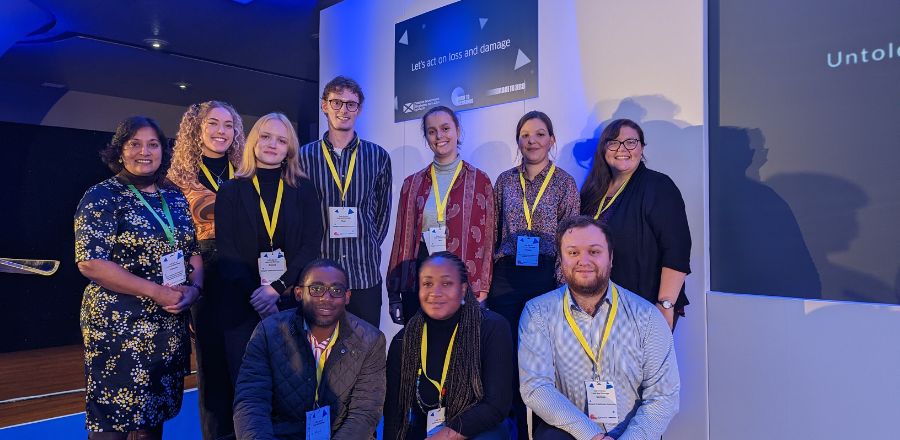Climate Justice students joined discussion at Scottish Government’s Loss and Damage Conference

Climate conscious students have had the unique opportunity to attend a conference run by the Scottish Government, which brought together international representatives to address the impacts of the climate crisis.
MSc Climate Justice students were invited to attend the Loss and Damage conference in Edinburgh, which was hosted by The Scottish Government in October 2022 to discuss how to reduce the impact the climate change is affecting vulnerable communities.
‘Loss and damage’ refers to the negative consequences of climate change on human societies and the natural environment. The conference was lead by First Minister Nicola Sturgeon, who outlined the objectives which were created as a result of COP26.
As well as international representatives, the discussions at the conference were joined by students studying Climate Justice and gave them opportunity to offer their views from a different perspective.
One of the students was Lisa Dockman, who only started the MSc Climate Justice programme only weeks before the Loss and Damage conference. Despite having worked in the climate justice sector for 15 years, Annalisa learned a lot from the conversations and also felt that attendees learned from the students as well:
How did the opportunity to attend the Loss and Damage conference come about?
“I’m currently studying MSc Climate Justice and we work closely with the Mary Robinson Centre for Climate Justice here at GCU. The Executive Director is really involved with the Loss and Damage Conference already, so she was able to extend the invite to let some of the students come for free. It was a really good chance for us to be involved in something exciting like this outside the University.
We got to act as participants at the conference which was really nice. I have a lot of respect for the Scottish Government for extending an invite to students studying Climate Justice, as this isn’t always a perspective that gets included in these types of conversations. We, as students, really felt like we were contributing and felt part of the discussions. For me, it really brought some interesting topics to light. It can be easy to have these conversations without having the justice element in mind, so being able to tie into that was really good and we learned a lot from each other. I also think that they learned something from us as well.”
Looking back at the conference, did you learn anything in particular that has stuck with you?
"I had actually never heard of the concept of loss and damage as it relates to climate change before going, despite having worked in the climate change for 15 years! I work in climate mitigation, which is about how we can reduce our emissions and slow down climate change. There is also the field of climate adaptation, which focuses on how we can adapt to the impacts already underway in our changing climate. We are already seeing changes in everything from severe weather events like storms to ocean warming and acidification – which are all having a dramatic impact on humans and the environment. In contrast, loss and damage is an emerging field that, to an extent, is all about dealing with the consequences of climate change that go beyond what people can adapt to. Loss and damage is all about those disproportionately responsible for climate change from the Global North having a responsibility to those in the Global South who are disproportionately dealing with the burdens of climate change."
For me, it was like a deep dive into what loss and damage is. Scotland seems to be the leader in this, which is great. First Minister Nicola Sturgeon was the keynote speaker, which was a shock as we didn’t know she was going to be there! She related a lot of what she said to when Scotland hosted COP26 and the movements that were discussed since then. Scotland has committed funds to support loss and damage and it was really impressive to see the contributions that are being made globally. A lot of the discussions were totally relevant to what we were learning in our studies, so it was really interesting.”
Find out more about studying Climate Justice on the GCU website
By Rachael McAlonan
Got a SCEBE or GSBS story? Email me at Rachael.McAlonan@gcu.ac.uk or connect with me on social media here
